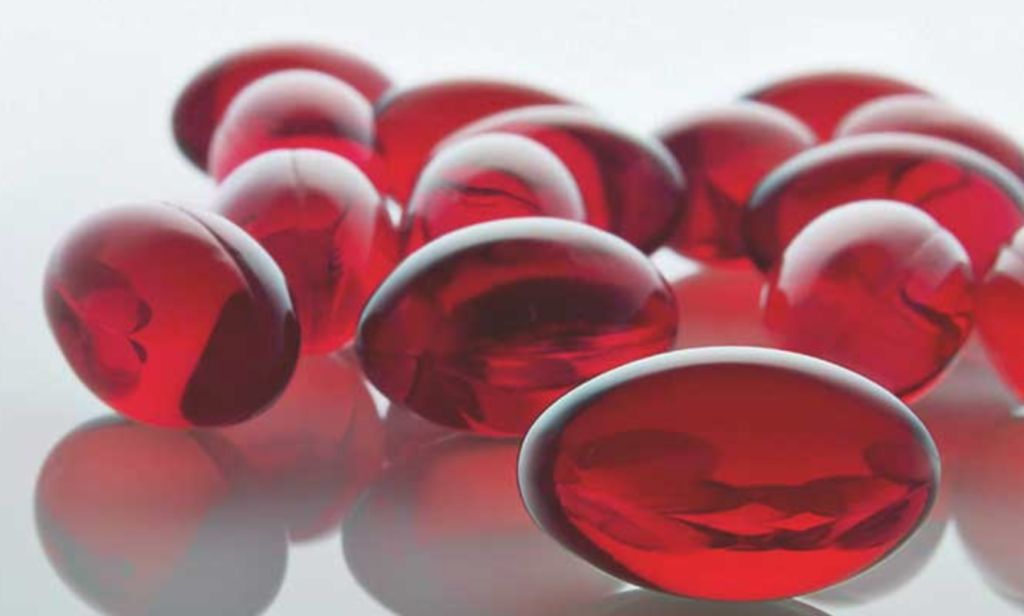
Many people take krill oil because its an excellent source for omega-3 fatty acids and krill oil is a popular alternative to fish oil for people who are worried about mercury and PCB contamination.
Krill oil is a supplement extracted from krill, a tiny crustacean that lives in the ocean.
Krill is also a more sustainable and potentially more ethical source for omega-3 fatty acids, though some of this depends on the particulars of how the oils are harvested.
Krill oil has the additional benefit of providing phospholipids, which may help boost health too.
The benefits of krill oil hinge in large part on choosing a high quality krill oil supplement, so it’s imperative that you choose a good one.
Our research team has separated the wheat from the chaff with our rankings of the best krill oil.
1. Antarctic Krill Oil
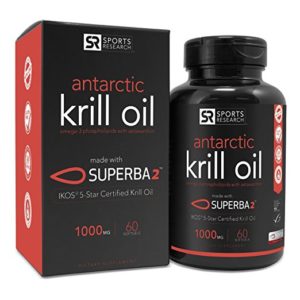
Click here for the lowest price on Amazon
With 1000 mg of highly pure krill oil per serving, Antarctic Krill Oil provides a high overall dose of the oil. This dosage breaks down into 400 mg of phospholipids, 128 mg of EPA, and 60 mg of DHA.
Additional antioxidant benefits come from the 1 mg of astaxanthin per serving, which is quite high for a krill oil supplement.
2. Neptune Krill Oil
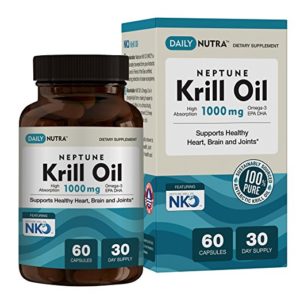
Click here for the lowest price on Amazon
Two things distinguish this krill oil supplement. The first is the very high dosage per capsule: 1000 mg of total krill oil. The EPA, DHA, and astaxanthin contents are solid as well.
Neptune is also the company that has funded much of the scientific research into krill oil, so many of the studies supporting its health benefits use this exact supplement. If you want to be sure that you are following the scientific research protocols as closely as possible, Neptune Krill Oil is the way to go.
3. Viva Naturals Krill Oil
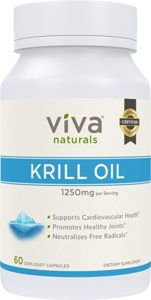
Click here for the lowest price on Amazon
Viva Naturals offers a krill oil supplement in a high dosage that provides a good portion of EPA and DHA–there are 1250 mg of total krill oil per serving and 165 and 95 mg of EPA and DHA, respectively.
The only downside is that the serving size is actually two softgels instead of one, so if you are only taking one capsule, you need to divide all these numbers by two.
4. Jarrow Formulas Krill Oil
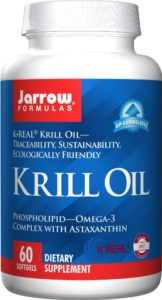
Click here for the lowest price on Amazon
Jarrow Formulas delivers 1200 mg of krill oil, divided up into two capsules per serving (so only 600 mg per capsule).
This product does not contain as much astaxanthin as some other competitors; there are only 0.11 mg per serving, so if this is an important component for you when it comes to krill oil, there might be better options.
5. Renew Naturals Antarctic Krill Oil
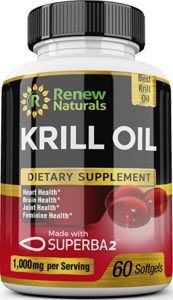
Click here for the lowest price on Amazon
With a moderate krill oil content per capsule (500 mg) but a high relative proportion of DHA and EPA, Renew Naturals’ take on krill oil is a good choice if your main goal is getting the active omega 3 fatty acid ingredients, and you’re less concerned about the total krill oil content. The astaxanthin content is solid, but not top of the line.
6. NutraBlast Krill Oil
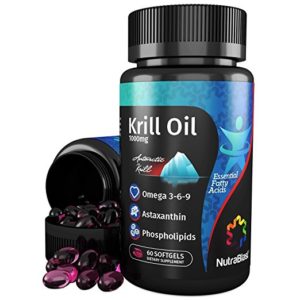
Click here for the lowest price on Amazon
With 500 mg of krill oil per serving, NutraBlast Krill Oil isn’t setting and potency records, but one thing does stand out.
The product is labeled in accordance with California’s Proposition 65, which sets strict requirements on purity when it comes to PCBs, a type of synthetic chemical that is associated with cancer and can be found in some ocean species. If you want to be sure your krill oil has low PCB levels it’s a good call.
7. Natrogix Antarctic Krill Oil
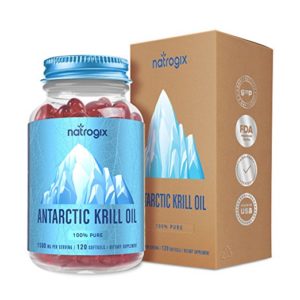
Click here for the lowest price on Amazon
Natrogix’s take on krill oil is pretty middle-of-the-road. The krill oil dosage is moderate, at 500 mg per capsule, and the astaxanthin is decent, but not the best.
It’s very pure, and does not have much in the way of extraneous ingredients, so it will appeal to purists, but beyond that, it does not distinguish itself in any particular direction–good or bad.
8. Bronson Antarctic Krill Oil
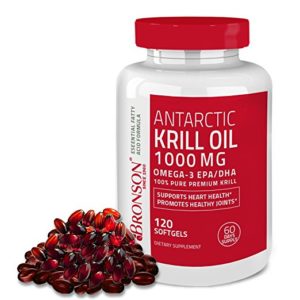
Click here for the lowest price on Amazon
Bronson Antarctic Krill Oil is another pretty standard take on krill oil: 500 mg of krill oil per capsule, and a moderate amount of DHA, EPA, and astaxanthin. Still, other competitors beat it out in each of these categories.
9. Schiff MegaRed
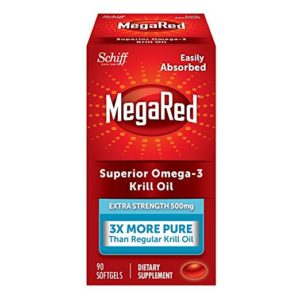
Click here for the lowest price on Amazon
While it’s very popular and it does have a high EPA and DHA content relative to its krill oil content, there’s no getting around the fact that MegaRed has a fairly low overall krill oil content per serving.
Each capsule only contains 350 mg of krill oil, and the astaxanthin content is quite small, at only 17 micrograms.
10. Nature Made Krill Oil
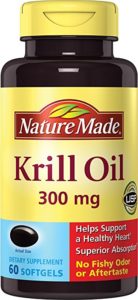
Click here for the lowest price on Amazon
Though Nature Made is a big brand and its products are ubiquitous, their krill oil supplement leaves much to be desired.
The serving size is quite small, at 300 mg of krill oil per capsule, and the EPA and DHA contents are extremely low. The same is true for the phospholipids. The label doesn’t even mention astaxanthin content, likely because it’s only present in trace amounts.
Krill oil benefits and side effects
Krill oil is becoming increasingly popular as a supplement because it combines the health benefits of the omega 3 fatty acids you’d find in fish oil with additional health-boosting power from the phospholipids and the astaxanthin that gives krill oil its distinctive deep red color.
The research on the benefits of krill oil is fairly new, but it appears that krill oil offers many of the same benefits as fish oil, but with some additional perks.
Benefits
As a source of omega 3 fatty acids, krill oil has all of the associated health benefits you’d get in a fish oil supplement too. These benefits are widely documented and affect a myriad of health conditions.
Omega 3 fatty acids (and especially their primary active ingredients, DHA and EPA) are associated with a decrease in risk factors for cardiovascular disease, as reported by a 2003 study published by the American Heart Association (1).
There is good evidence for their benefits in mental health too: a review in the Journal of Clinical Psychology in 2006 discussed the various uses of omega 3 fatty acids in the prevention and treatment of depression (2), and other research indicates that it can help prevent cognitive decline in the elderly (3).
The real question is whether krill oil offers any additional or independent benefits beyond those of normal fish oil. Fortunately, there’s a lot of research that can help answer this question.
Some evidence from animal studies is promising. In a 2010 study, researchers experimentally induced rheumatoid arthritis (an inflammatory disease of the joints) in mice (4).
The researchers split the mice into three groups: one which received a krill oil supplement, another group that received a fish oil subject, and a final group that acted as a control.
The researchers found that the krill oil was particularly effective at staving off rheumatoid arthritis in the mice. Because the krill oil reduced markers of inflammation at the cellular level in the mice, the researchers proposed that krill oil has especially effective inflammation-fighting properties.
Further research substantiated these claims in human subjects. In a short two-week randomized trial, a paper published in the Journal of the American College of Nutrition found that volunteers with rheumatoid or osteoarthritis received either a krill oil supplement (300 mg per day) or a placebo to serve as a control group.
The researchers found that blood levels of inflammatory chemicals decreased in the krill oil group when compared to the control group.
Though the duration of this study was short, and longer-term studied would be needed to study the clinical outcome of such an intervention, the evidence is promising that krill oil could be a useful treatment for arthritis and other joint pain related to inflammation.
Krill oil has also been found to decrease the symptoms of premenstrual syndrome in women.
One study, funded by a company that manufactures krill oil, found that women who took a krill oil supplement over the course of three months experienced fewer symptoms of premenstrual syndrome and had to take fewer over-the-counter pain medication during the course of the study to treat their symptoms (5).
Krill oil may also be more effective than an equivalent dose of fish oil when it comes to reducing risk factors for cardiovascular disease.
That was the conclusion of a 2004 study in the journal Alternative Medicine Reviews (6). That study split a large population of volunteers into four groups that received low or high doses of krill oil, fish oil, or a placebo.
The researchers followed the subjects for 90 days and studied the change in blood sugar, cholesterol, and blood triglycerides–high levels of any of these are strong risk factors for cardiovascular disease.
The study found that, when delivered at equivalent doses, krill oil resulted in a greater reduction in cholesterol and triglycerides than fish oil.
Not all researchers are enamored with krill oil. One study by Stine Ulven and colleagues Akershus University College in Norway studied the differential effects of fish oil and krill oil in human volunteers (7).
They found that neither had a significant effect on several markers of metabolic activity, but they did find that fish oil and krill oil resulted in a similar increase in omega 3 fatty acids in the blood, even though the DHA and EPA content of krill oil was only two-thirds that of fish oil.
This may suggest that krill oil has higher bioavailability than fish oil, meaning that you’ll absorb more of the omega 3 fatty acids from krill oil than an equivalent amount of fish oil.
Side effects
Much like its cousin supplement, fish oil, krill oil is extremely well-tolerated. The only side effects that are reported are minor: a trivial number of people report mild gastrointestinal discomfort, and some supplements can cause a transient “fish-like” taste in your throat.
One of the key benefits of krill oil over traditional fish oil is that there is less concern about PCB and mercury contamination in krill oil, because the krill used to produce it are harvested from very cold, infrequently-travelled antarctic waters.
The level of contamination in these waters is thought to be much less than in the ocean at large. If this is something you’re concerned about, choose a krill oil supplement that is tested for mercury and PCB content.
Recommended dosage
Because so much of the research on krill oil is funded by the companies that make krill oil supplements, the dosages used in research studies usually reflect the dosage available in the supplement that’s the source of the research funding.
With that caveat, the research indicates that doses of at least 300 mg of krill oil per day are optimal. However, research on fish oil typically uses higher doses to deliver higher amounts of DHA and EPA to the bloodstream.
Considering this, alongside the excellent safety profile of krill oil, it’s probably a good idea to aim for more like 800-1200 mg of krill oil per day for the best chance of broad-spectrum health benefits.
You can achieve this with one high-dose supplement, or by taking a smaller dose supplement a few times during the day.
Recap
Krill oil is an extremely promising and very safe supplement for delivering omega 3 fatty acids to your body, fighting inflammation, and possibly for preventing premenstrual syndrome as well.
While it’s still unclear whether krill oil is superior in all regards to fish oil, it does seem to have additional benefits.
Because it is so new, there is still a need for independent research into the long-term benefits of taking krill oil, but if you want the benefits of fish oil plus additional joint pain or premenstrual syndrome-fighting effects, krill oil is an excellent addition to your supplement regimen.
https://bodynutrition.org/krill-oil/ http://bodynutritionorg.tumblr.com/post/167957851734
No comments:
Post a Comment